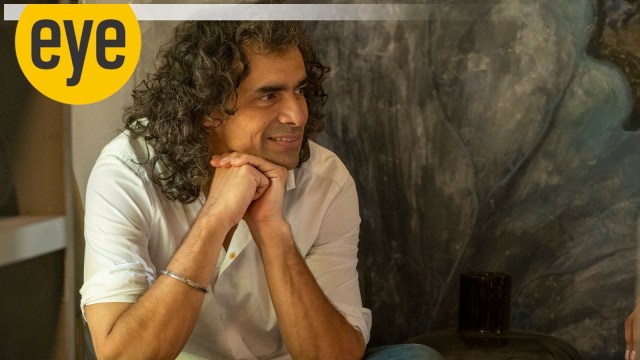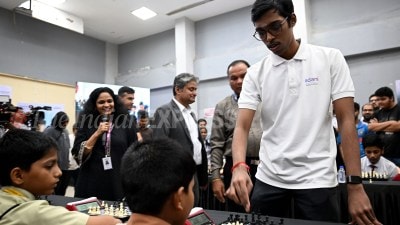Imtiaz Ali on collaborating with Diljit Dosanjh for Chamkila, calls AR Rahman his ‘co-storyteller’ for the film
Writer-director Imtiaz Ali on how he was unexpectedly offered the rights to make Amar Singh Chamkila's biopic, reuniting with AR Rahman and why he couldn't have made the film without Diljit Dosanjh.
 Imitaz Ali's Amar Singh Chamkila is streaming on Netflix.
Imitaz Ali's Amar Singh Chamkila is streaming on Netflix.Making a departure from presenting contemporary relationship stories, director-writer Imtiaz Ali dramatised the life and legend of popular Punjabi singer Amar Singh Chamkila, who was killed when he was 27, along with his co-singer and wife Amarjot Kaur on March 8, 1988. This compelling biopic of Chamkila, who faced much flak for writing ‘vulgar’ lyrics even as his fame and fandom grew beyond Punjab, reunited Ali with AR Rahman, making this their fourth collaboration after Rockstar (2011), Highway (2014) and Tamasha (2015).
In this interview, Ali talks about taking a deep dive into the slain singer’s life for the film Amar Singh Chamkila, which dropped on Netflix this Friday, his effort to familiarise the audience with the Punjabi artiste’s work and having Rahman as a co-storyteller. Excerpts:
In an effort to make the audience understand the lyrics of Amar Singh Chamkila’s songs, which were often controversial, his songs in the films come with both Hindi translations in the Roman script as well as English subtitles.
Many artistes are judged in their times for the work that they do because it does not meet the standards of society. Chamkila was subjected to a dual-faced reaction from the audience. People loved his songs but they also criticised him. That was mainly because of what he said in his songs, which were bold, controversial and licentious. People were ashamed to admit that they listened to Chamkila. So, the lyrics had to be understood by the audience.
Chamkila’s songs were in Punjabi and our film, Amar Singh Chamkila, is in Hindi. I am expecting that those who watch our film, kind of know Hindi. But understanding Punjabi is not possible for them. My responsibility as a filmmaker is to translate that in an interesting manner. We have used this clever ‘titling’ so that as he says something in Punjabi, it is translated and conveyed to the non-Punjabi audience.
When did you come across Chamkila’s songs and what made you take a deep dive into his life?
I came to know about Chamkila about 15 years ago while touring Punjab and Himachal Pradesh. I found that the locals would always listen to Chamkila whenever they wanted to have fun. I was intrigued by this singer who appealed to the people at the grassroots. It is a gift to be able to enjoy such mass popularity. Soon, I obviously got introduced to the events of his life. I learnt that he died at the age of 27 and that he came from a very disadvantaged background. When Punjab was burning in the ’80s, it happened to be Chmakila’s golden period. Everyone was listening to the happy songs that he was making.
Nearly five years ago, Harpreet Singh, who managed the rights of making a film on Chamkila’s life, came to Mumbai looking for me. Harpreet thought I would be the right person to make this film even though he didn’t know me. In the past, many had tried to make a film on him but hadn’t managed to do so because of the issues over rights.
 Parineeti Chopra and Diljit Dosanjh in Amar Singh Chamkila. (Photo: Netflix © 2024)
Parineeti Chopra and Diljit Dosanjh in Amar Singh Chamkila. (Photo: Netflix © 2024)
Also Read: EXCLUSIVE | Diljit Dosanjh: ‘Amar Singh Chamkila is bigger than Elvis Presley for us’
What was your reaction when Harpreet first met you?
I told him that I knew about Chamkila but I wasn’t sure that I should make this film. I wondered what I had to offer as a director. My brother Sajid (Ali) got involved. He wrote the first draft and went for the initial round of recce. Then, I gradually realised that many things related to Chamkila’s life resonated with me. They echo my feelings and fears. Moreover, it’s the story of an artist’s life and his love for his work.
How exhaustive was the research?
It was a long-drawn process. I met many people who were part of Chamkila’s life. I visited the places where he would perform. I met his family members; the musicians who accompanied him; and people who have attended his shows. I also watched the videos of his shows available on YouTube. This research was led by my interest and was not scholastic in nature. It is never enough but over a period of time, I learnt many things about him. Then, at one point, I thought let me make the film.
When did AR Rahman come on board?
All artistes have this gift but Rahman has this overwhelming gift of subconsciously grasping what you want to talk about (in the movie). The kind of music that he plays in the movie and where he chooses to place them match exactly what I had in mind. He is not just a music director. He loves to work on the film too. He is a co-storyteller with me, especially for this film. That’s why the music never comes in the way of the narrative in Amar Singh Chamkila.
To complete this musical reunion, you also roped in singer Mohit Chauhan and lyricist Irshad Kamil.
We are aware of the fact that we are comfortable with each other. So, we always ask ourselves if we are working together for comfort or the film. We try to be truthful to the work we are doing. For Ishq Mitaye, we wanted an impressive North Indian voice which communicates the story of Chamkila as well as that of Punjab. I usually approve the lyrics. When Mohit is involved, he sings the lyrics and then I take time to approve. That was the process for the songs— Ishq Mitaye and Baaja.
Was Diljit Dosanjh the natural choice to play the titular protagonist?
It was the natural choice. We couldn’t have done it without him as there is a lot of live singing. What you hear him sing in the movie is not dubbed; it is recorded live.
You kept mailing Diljit your thoughts about Chamkila. Were you nudging him to be ready for the role?
Yes, I was doing that and he knew it. He is intelligent and sensitive. I wanted him to understand the character in his own way and process these notes at his own time. He knew a lot about Chamkila and like many Punjabi musicians he had also performed the latter’s songs at gatherings during his younger days.
Was Parineeti Chopra too a natural choice to play the role of Amarjot Kaur?
Absolutely. Parineeti sings beautifully and she is Punjabi. She looks a bit like Amarjot too. She also put on weight for this role.
We don’t get to know much about Amarjot’s thoughts in the film. Was it deliberate?
I knew I was making the film from Chamkila’s point of view. There was already so much happening in the film that we couldn’t accommodate any more stories in it. We also have to be sensitive to the duration. In a way, Amarjot’s character becomes more intriguing. Someone else can tell the story from her perspective.
- 01
- 02
- 03
- 04
- 05































